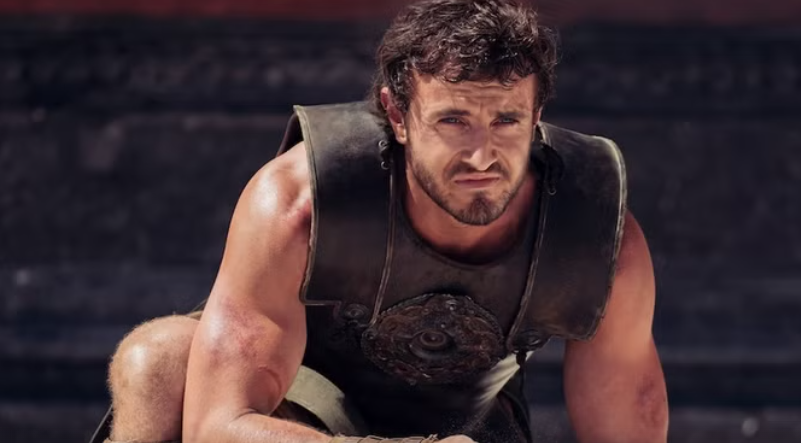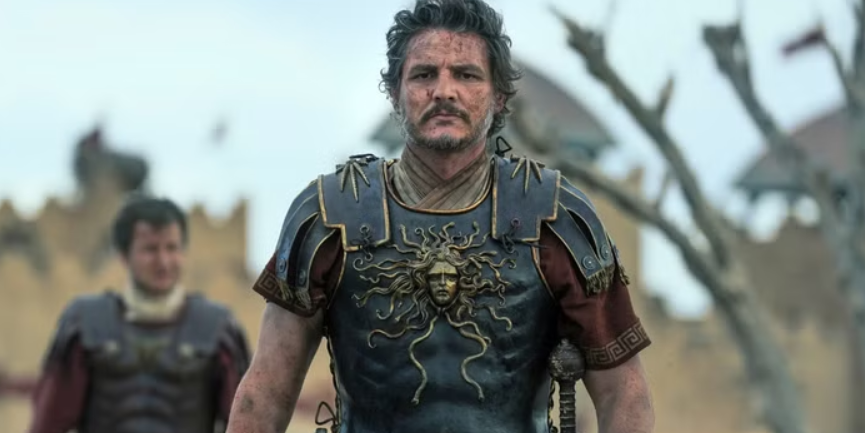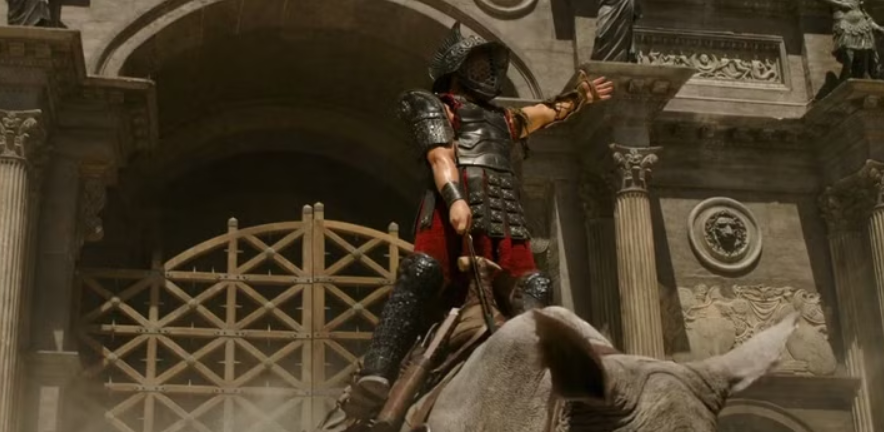Gladiator II Review: Revisiting Rome’s Bloody Glory with Politics, Power and Revenge
Key Takeaways:
- Gladiator II delves deeper into the political and social fabric of Rome, exploring power struggles in a way that expands Ridley Scott’s epic universe.
- Strong performances from the cast, especially Denzel Washington, add dramatic intensity, though Paul Mescal’s Lucius faces inevitable comparisons to Russell Crowe’s iconic Maximus.
- The film’s grandiose action sequences, while impressive, occasionally feel overly reliant on CGI, leaving audiences divided over its execution.

Ridley Scott’s Gladiator (2000) made an indelible mark on cinema, bringing ancient Rome’s brutality and beauty to life in ways both stunning and deeply human. As one of Scott’s most iconic works, it not only earned him accolades, including a Best Picture Oscar, but cemented Russell Crowe’s portrayal of Maximus as legendary. Now, over two decades later, Scott returns with Gladiator II, a sequel that ventures back to Rome’s blood-stained sands, but with a twist: it shifts focus from personal vengeance to an elaborate tale of power, politics, and ambition. Although undeniably grand, the sequel has stirred up mixed reactions. Can it live up to its predecessor’s legacy? Let’s dive into what Gladiator II brings to the table and where it falls short.
What’s Gladiator II About?
Gladiator II takes place years after Maximus’ death, with the Roman Empire in turmoil. Rome is now led by two eccentric and dangerous brothers, Emperors Geta and Caracalla, played by Joseph Quinn and Fred Hechinger. The empire expands, but cracks in its foundation are visible as Rome’s citizens grow increasingly disillusioned. The hopeful spark that Maximus once ignited in the Colosseum is dimming fast, and Rome appears diseased, its future uncertain.

In this sequel, Lucius (Paul Mescal), the son of Maximus’ beloved Lucilla (Connie Nielsen), is far removed from Rome, living a modest life in the free African city of Numidia. However, his world shatters when the ruthless Roman general Marcus Acacius (Pedro Pascal) invades, leading to the tragic death of Lucius’ wife, Arishat (Yuval Gonen), and his own enslavement. Forced to fight for survival in the Colosseum, Lucius trains under Macrinus (Denzel Washington), a former slave with a Machiavellian knack for manipulating Rome’s upper echelons. As Lucius gears up for revenge against Acacius, unrest within Rome’s political circles deepens, with Lucilla orchestrating her own scheme to dethrone the tyrannical emperors.
Political Intrigue Takes Center Stage
The shift in Gladiator II from the original’s revenge-driven storyline to a broader political narrative is both bold and refreshing. In collaboration with screenwriter David Scarpa (of Napoleon fame), Scott builds a complex world filled with ambition, deception, and double-crossing. This story digs deeper into Rome’s intricate power plays, where wealth and whispered secrets hold sway over brute strength. The film leans into this Game of Thrones-style intrigue, drawing the audience into the conspiracies behind Rome’s throne, where loyalty is fleeting, and power is the ultimate prize.
Lucilla, played once again by Connie Nielsen, emerges as a strong, multifaceted character. Now more politically savvy, she navigates the chaos with precision, embodying the cunning required of someone attempting to outwit Rome’s unpredictable rulers. This focus on Lucilla’s development gives the story a richer emotional depth, especially as she unknowingly crosses paths with her son, Lucius, who has returned to Rome under dire circumstances.
Unhinged Emperors: Geta and Caracalla
Quinn and Hechinger deliver standout performances as Rome’s co-emperors, Geta and Caracalla. Their portrayal of these wild, bloodthirsty siblings elevates the story’s tension. The brothers are driven less by concern for their citizens and more by a lust for power, their rule marked by cruelty and erratic behavior. Their deranged approach to governance draws an uncomfortable yet captivating comparison to Joaquin Phoenix’s Commodus in the original Gladiator, though these emperors add their own twist of flamboyant cruelty. Their scenes, while often bordering on darkly comedic, add to the ominous atmosphere of a Rome that seems on the verge of collapse.

Paul Mescal as Lucius: A New Gladiator, but Same Old Path?
Lucius’ journey echoes much of Maximus’ original story arc, following his own path from loss to revenge. Though Paul Mescal delivers a commendable performance, his character’s development suffers due to its familiarity. From the brutal murder of his wife to his enslavement and gladiatorial battles, Lucius’ motivations and narrative beats feel strikingly similar to those of his father figure, Maximus.
This similarity might resonate with fans nostalgic for the original, but it also sets up an inevitable comparison that doesn’t entirely work in Lucius’ favor. Where Maximus’ journey was fueled by raw, gut-wrenching emotion, Lucius’ character lacks the same intensity and layered complexity. Despite Mescal’s strong portrayal, Lucius fails to command the same attention and empathy as Maximus, resulting in a character arc that feels more like a tribute than a fully realized evolution.
Denzel Washington as Macrinus: The Film’s Powerhouse
Without question, Denzel Washington’s performance as Macrinus is among Gladiator II’s most compelling elements. As a former slave turned powerful figure, Macrinus exudes an effortless authority and charisma that enriches every scene he’s in. Washington’s portrayal blends Shakespearean gravitas with devious charm, making him a formidable presence. His character acts as both a mentor and a manipulator to Lucius, orchestrating events with a skill that highlights his mastery of Roman political games. When Washington is on screen, the film crackles with energy; his complex portrayal of Macrinus adds depth to the overarching themes of power and betrayal.

Rome’s Colosseum Battles and Scott’s Love for Grand Scale Action
Gladiator II spares no expense in crafting larger-than-life action sequences, from battles on Roman soil to a jaw-dropping naval clash within the Colosseum, complete with sharks waiting in the flooded arena. These scenes showcase Ridley Scott’s skill for creating epic visual spectacles, pushing the boundaries of what audiences might expect in terms of scale. However, not every sequence lands seamlessly. In particular, the Colosseum fight involving a pack of ferocious monkeys, while intended to heighten the terror, struggles with an overreliance on CGI, making it difficult to fully suspend disbelief.
Scott’s ambition to top his own accomplishments sometimes makes these sequences feel excessive, risking a descent into visual absurdity. Still, when it works, it’s thrilling a testament to Scott’s commitment to pushing cinematic limits and delivering a Roman experience that’s both grand and gritty.
A Cast That Shines, but Familiarity That Haunts
The film’s supporting cast, including Pedro Pascal as General Acacius, delivers standout performances that bring further nuance to Gladiator II. Pascal’s portrayal of Acacius, in particular, lends complexity to a character whose inner conflict shines through his hardened exterior. Unfortunately, Acacius’ story arc feels somewhat underdeveloped, with fewer scenes than one might hope. His character exudes a sorrowful intensity that deserved more exploration.

The return of Connie Nielsen’s Lucilla is another highlight. With a more significant role, she carries an emotional weight that serves as the backbone of the sequel’s more complex story, demonstrating her political acumen in a time of turmoil.
Critical Reception: Praised and Panned
Gladiator II has garnered mixed reviews. Critics agree on some of the film’s strong suits namely, Washington’s captivating performance and Scott’s talent for grand spectacle. However, they also note that the film’s familiar plot structure and occasional CGI missteps keep it from reaching the emotional heights of its predecessor. Some see Mescal’s Lucius as a solid, if somewhat “millennial” version of Maximus, while others find the rehashed elements detract from his potential as a standalone protagonist.
Reviews from publications like The Guardian and The Telegraph commend the film as a spectacle but stop short of calling it a worthy successor to Gladiator. Variety described it as a “shadow” of the original, and The Wrap expressed disappointment in the storyline, noting that the film leaned too heavily on rehashed plot devices rather than investing in fresh, unique character arcs.
Final Thoughts on Gladiator II
Gladiator II is an ambitious sequel that seeks to blend the grandiosity of ancient Roman spectacles with a deeper exploration of political treachery. The film succeeds when it carves new ground, especially through its exploration of power, loyalty, and betrayal within Rome’s treacherous hierarchy. With Washington and a talented supporting cast adding rich, dramatic layers, Gladiator II is a worthwhile watch for fans of historical epics.
But it struggles under the weight of its predecessor’s shadow, and Lucius’ arc is held back by narrative choices that feel too safe and predictable. While Gladiator II might not have the lasting impact of the original, it’s a cinematic journey worth taking for those looking to return to the Roman arena.
FAQ
1. Who is the main character in Gladiator II? Lucius Verus, the son of Lucilla and the adopted son of Maximus from the first Gladiator, is the protagonist. Portrayed by Paul Mescal, Lucius embarks on a journey that mirrors Maximus’ path but with a unique political twist.
2. Does Russell Crowe return in Gladiator II? No, Russell Crowe does not reprise his role as Maximus, as his character died in the original film. However, the story keeps Maximus’ legacy alive through Lucius’ journey.
3. How does Gladiator II compare to the original? Gladiator II expands on the original by focusing more on political intrigue than solely gladiatorial combat. While it doesn’t reach the emotional impact of Gladiator, the sequel brings a fresh perspective on Rome’s political landscape.
4. What are some standout performances in the film? Denzel Washington, Connie Nielsen, and Pedro Pascal deliver notable performances, with Washington’s portrayal of Macrinus particularly praised for its intensity and depth.
5. When is Gladiator II releasing in theaters? The film is scheduled for release on November 22, 2024.





